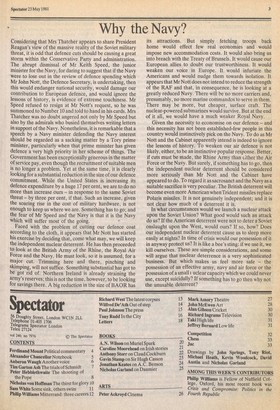11, Why the Navy?
Considering that Mrs Thatcher appears to share President Reagan's view of the massive reality of the Soviet military threat, it is odd that defence cuts should be causing a great storm within the Conservative Party and administration. The abrupt dismissal of Mr Keith Speed, the junior minister for the Navy, for daring to suggest that if the Navy were to lose out in the review of defence spending which Mr John Nott, the Defence Secretary, is undertaking, then this would endanger national security, would damage our contribution to European defence, and would ignore the lessons of history, is evidence of extreme touchiness. Mr Speed refused to resign at Mr Nott's request, so he was summoned to Number 10 and told to hand in his cards. Mrs Thatcher was no doubt angered not only by Mr Speed but also by the admirals who busied themselves writing letters in support of the Navy. Nonetheless, it is remarkable that a speech by a Navy minister defending the Navy interest should be regarded as a sacking matter by a Tory prime minister, particularly when that prime minister has given defence a very high priority in her scheme of things. The Government has been exceptionally generous in the matter of service pay, even though the recruitment of suitable men is no longer a problem. Yet at the same time, it is clearly looking for a substantial reduction in the size of our defence commitment. While the United States is increasing its defence expenditure by a huge 17 per cent, we are to do no more than increase ours — in response to the same Soviet threat — by three per cent, if that. Such an increase, given the soaring rise in the cost of military hardware, is not enough to keep us where we are. Something has to go; and the fear of Mr Speed and the Navy is that it is the Navy which will suffer most of the going.
Faced with the problem of cutting our defence coat according to the cloth, it appears that Mr Nott has started his exercise by deciding that, come what may, we will keep the independent nuclear deterrent. He has then proceeded to look at the British Army of the Rhine, the Royal Air Force and the Navy. He must look, so it is assumed, for a major cut. Trimming here and there, pinching and skimping, will not suffice. Something substantial has got to be got rid of. Northern Ireland is already straining the army's reserves; this is not the time, however, to be looking for savings there. A big reduction in the size of BAOR has
its attractions. But simply fetching troops back home would effect few real economies and would impose new accommodation costs. It would also bring us into breach with the Treaty of Brussels. It would cause our European allies to doubt our trustworthiness. It would weaken our voice in Europe. It would infuriate the Americans and would nudge them towards isolation. It appears that Mr Nott does not intend to reduce the strength of the RAF and that, in consequence, he is looking at a greatly reduced Navy. There will be no more carriers and, presumably, no more marine commandos to serve in them. There may be more, but cheaper, surface craft. The nuclear-powered submarines would survive. But at the end of it all, we would have a much weaker Royal Navy.
Given the necessity to economise on our defence — and this necessity has not been established-few people in this country would instinctively pick on the Navy. To do as Mr Nott and the Cabinet apparently intend is indeed to ignore the lessons of history. To weaken our air defence is not likely, either, to be an instinctive popular response. Better, if cuts must be made, the Rhine Army than either the Air Force or the Navy. But surely, if something has to go, then the independent nuclear deterrent should be considered more seriously than Mr Nott and the Cabinet have appeared to do. To regard it as sacrosanct and the Navy as a suitable sacrifice is very peculiar. The British deterrent will become even more American when Trident missiles replace Polaris missiles. It is not genuinely independent; and it is not clear how much of a deterrent it is.
In what circumstances would we launch a nuclear attack upon the Soviet Union? What good would such an attack do us? If the American deterrent were not to deter a Soviet onslaught upon the West, would ours? If so, how? Does our independent nuclear deterrent cause us to sleep more easily at nights? In time of crisis would our possession of it
in anyway protect us? It is like a bee's sting: if we use it, we kill ourselves. These are simple considerations, and some will argue that nuclear deterrence is a very sophisticated business. But which makes us feel more safe — the possession of an effective army, navy and air force or the• possession of a small i uclear capacity which we could never use, except suicidally? If something has to go then why not the unusable deterrent?










































 Previous page
Previous page